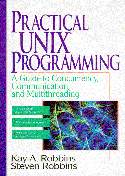
 CS 3733 Operating Systems
CS 3733 Operating Systems 
 CS 3733 Operating Systems
CS 3733 Operating Systems
Read Sections 6.1 and 6.2.1 of SG
item buffer[n];
int in = 0; /* next free buffer */
int out = 0; /* first full buffer */
int counter = 0; /* number of full buffers */
Pool is empty when counter = 0 and is full when
counter = n.
Producer loop:
produce an item in nextp
while (counter == n) ;
buffer[in] = nextp;
in = (in+1) % n;
counter++;
Consumer loop:
while (counter == 0) ;
nextc = buffer[out];
out = (out+1) % n;
counter--;
consume the item in nextc
Although each routine is correct by itself, they do not function
correctly when run concurrently. How are
counter++ and counter-- implemented?
int turn = 0; /* shared */
PROCESS 0: PROCESS 1:
while(1) { while(1) {
while (turn != 0) ; while (turn != 1) ;
turn = 1; turn = 0;
} }
int flag[2] = {0, 0}; /* shared variable */
PROCESS 0: PROCESS 1:
while(1) { while(1){
flag[0] = 1; flag[1] = 1;
while (flag[1]); while (flag[0]);
flag[0] = 0; flag[1] = 0;
} }
Skill: Understand what the critical section problem is.